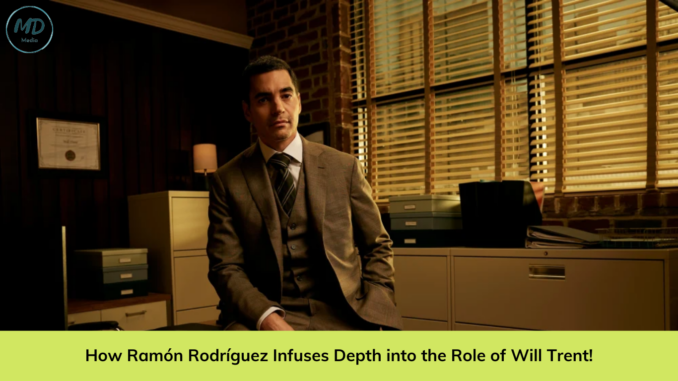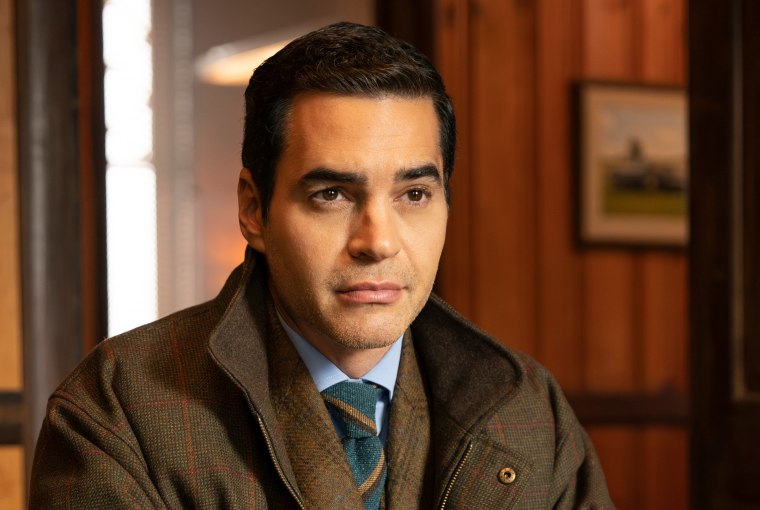
When he was first approached to play the title detective in “Will Trent,” the acclaimed ABC crime drama based on Karin Slaughter’s bestselling book series of the same name, Ramón Rodríguez didn’t think he was the right fit.
Having starred in a handful of unsold TV pilots and short-lived series, including the Fox crime drama “Gang Related” and the ABC remake of “Charlie’s Angels,” Rodríguez had reason to be cautious. But there was one other crucial detail that Rodríguez, who is of Puerto Rican heritage, couldn’t easily overlook: In Slaughter’s novels, Will is described as white, tall and lanky with short dirty-blond hair; Rodríguez, on the other hand, is of medium build with brown skin and dark, graying hair.
It wasn’t until Rodríguez met with Liz Heldens and Daniel Thomsen, the creators and showrunners of the “Will Trent” adaptation, that he began to see himself in the role of a dyslexic orphan who overcame a harsh upbringing in Atlanta’s foster care system to become the special agent with the highest clearance rate at the Georgia Bureau of Investigation, or GBI.
Rodríguez insisted on donning his character’s signature three-piece suits and adopting a regionally specific Southern drawl, and his steadfast commitment to portraying one of the most idiosyncratic protagonists on television has transformed “Will Trent” into a certified hit. A month after the second season recorded its highest-ever multiplatform telecast, with over 9 million viewers across seven days of viewing, ABC renewed “Will Trent” for a third season. Since it debuted as a midseason replacement in January 2023, the show has reportedly reached nearly 70 million viewers.
At a time when successful shows with diverse leads have dwindled amid cost-cutting measures in Hollywood, this reimagining of “Will Trent” is a big win for Latino representation — but in a way that subverts common tropes.
Given that he was abandoned at birth, Will begins the series with little knowledge of his own cultural heritage, which has given Rodríguez a rare opportunity to play a deeply troubled and complicated character whose ethnicity isn’t at the forefront of his characterization.
“I liked the fact that his ethnicity was ambiguous, that it was open-ended, so he could actually potentially look like me, aside from the specifics of how they write him in the book,” Rodríguez, who is also a co-executive producer on the series, said in a recent interview.
But in the final minutes of the 13-episode first season, Will discovers that his current boss, Amanda Wagner (Sonja Sohn), knew his late mother, Lucy Morales (Raiany Silva), a sex worker who grew up in Puerto Rico and was murdered in Atlanta by serial killer James Ulster (Greg Germann), who may also be his biological father. Will learns not only that Amanda found him in a trash can as a baby, but also that she named him and tried unsuccessfully to adopt him.
In season two, Will has tried to connect with his roots, starting with learning how to speak Spanish. “He’s learning a language that connects to him personally and directly to his mom,” said Rodríguez, who joked that, as a native speaker, he found it a challenge to sound more like a non-native. “The writers and I like seeing Will in uncomfortable and awkward moments of having to be vulnerable, so we’ll see more of those moments.”
Midway through the second season, Will musters up the courage to meet his dyslexic, long-lost uncle, Antonio Miranda (John Ortiz), who offers to share his memories of his late older sister, and the two bond over their shared learning disability. For the first time, Will, who has spent most of his life suppressing his traumatic upbringing on his own, feels he has some kind of semblance of the family that he has always wanted.

Thomsen told NBC News: “For Will, we’re taking him on the journey of adding something into the identity that he had created for himself. He’s a guy who is very strongly identified with the GBI, with Atlanta and all the different places that he grew up. I think what’s interesting is just getting that information so late in life when you already felt like you had a fixed definition of who you were and having that be thrown into a blender.”
‘Will Trent’ is a big win for Latino representation — while subverting common tropes.
Like his character, Rodríguez was raised by women; he grew up in the ’80s and ’90s with his single mother and three older sisters in a cramped apartment in Manhattan’s Lower East Side, when it was still a low-income, predominantly Black and brown barrio. Coming of age in the melting pot that was — and still is — New York City had an indelible impact on Rodríguez, who calls himself a proud “Nuyorican.”
“I grew up in an era that if you stayed with someone too long, that could be a fight,” he said of growing up around drug dealers and gangs. “All that stuff has a role and shapes you, and I think with each experience along the way, being a New Yorker, there’s this heightened sensitivity. You get exposed to everything and anything.
“I wouldn’t change my childhood growing up with all women in a tiny apartment in the Lower East Side for anything. We are a very tight-knit family,” he added. “Being the one boy at the time and man in the house, I’m very protective of my family and my sisters. I think that’s something with Will, as well. If you’re close to him, if he lets you in, he’s incredibly loyal and protective.”
“Will Trent” marks the first time that Rodríguez has been a series regular on a show that has lasted multiple seasons — a highlight in a two-decade career that began in earnest with a love for basketball. He got a scholarship to a university in West Virginia and later transferred to New York University, where he earned a sports marketing degree and then worked as an intern for the New York Knicks. Rodríguez caught the attention of Nike’s marketing team at a public competition where it was giving away free sneakers. Rodríguez’s ability to spin a basketball atop a pen in his mouth led to his being cast in a series of commercials, which piqued his interest in acting and working in front of the camera.
At the start of his career, Rodríguez wore cornrows, which he said helped him land certain jobs as street-tough gangsters in “Rescue Me,” “Day Break” and “The Wire.” But he noticed a clear shift once he cut his hair and landed a role in “Transformers: Revenge of the Fallen.” Now, he’s more interested in playing roles that expand people’s perceptions of what Latinos can accomplish in Hollywood, in the same way that Desi Arnaz inspired him with his work in “I Love Lucy.”
“I’ve passed on a lot of jobs like that, and I go, ‘No, I’m not doing that anymore,’ especially if it’s very simple. If there’s no complexity or interesting layers to the character, then I’m not really interested in portraying that anymore,” Rodríguez said of his desire to push back against one-dimensional, stereotypical Latino roles. “That’s not to knock anybody else that comes in and does take it, because we all got to get in the game. But for me, I’ve been fortunate enough to be in a spot where I can say no and try to find the right character and project where I feel like we are doing something in a positive way or that’s creatively interesting.”
Before production began on the second season of “Will Trent” — which he said he insisted on producing to ensure it wasn’t perpetuating stereotypes about Latinos — Rodríguez shot the action-thriller film “G20, in which he co-stars. Viola Davis plays an American president who must use all her statecraft and military experience to defend the world when terrorists overtake the G20 Summit in Cape Town, South Africa.
“That was one of the few times I’ve had a Latina director,” Rodríguez said of working with Mexican filmmaker Patricia Riggen (“Miracles from Heaven,” “Under the Same Moon”). “My lead [in] the movie is African American, and I’m right there next to her the whole movie. It’s beautiful, and it’s a great story.”
Rodríguez recognizes that he stands on the shoulders of Latino actors — many of whom are Puerto Rican — who have helped pave the way for him to tell the kinds of stories that matter the most to him, following in the footsteps of the likes of the late Raul Julia, as well as John Leguizamo, Benicio del Toro and Rita Moreno. He said that like his peers, he’s still fighting to get the funding and the support to tell stories on his own terms.
For instance, Rodríguez has written a screenplay for a feature film that is set in New York and Puerto Rico and loosely based on his relationship with his estranged father, with whom he has since mended fences. He said he wants to one day tell the Latinos’ version of “Moonlight” or “Parasite” — culturally specific stories starring people of color that have gone on to be box-office hits and win Academy Awards.
“I love it when I see the African American community getting behind each other and creating these stories and the companies that are doing that. We need more Latino companies that do that. We need more Latino executives sitting at those tables making those decisions,” said Rodríguez, who admitted that he has sat at his fair share of pitch meetings with white executives who don’t understand the diversity and nuances of Latino cultures.
At the end of the day, television and film are about telling an interesting story, he said. “You might be reading subtitles, but it doesn’t matter. You can connect and relate because there’s a universality to good, quality storytelling. So we just need more opportunities, period. That’s the bottom line. However we get them, I would love to see that door get busted wide open and be able to tell more of our stories authentically, and they need to trust us to tell our stories. Let us tell ’em!”
“Will Trent” airs Tuesdays at 8 p.m. ET/7 p.m. CT on ABC. Episodes stream the next day on Hulu.